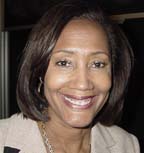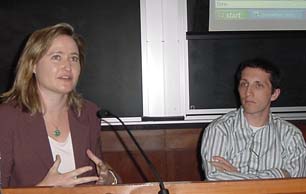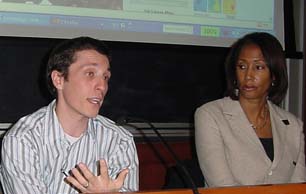|
Spinners and Bloggers: Political Communications in the Digital Age Thursday,
October 20, 2005 |
|||
|
For decades, perhaps for as long as independent newspapers have existed, political operatives have used "spin" to shape the way the news media respond to candidates and their policies. Spin can be understood as a kind of top-down power that depends on the social network linking political leaders and the news media. Some have argued that weblogs or blogs have emerged in recent years to disrupt this culture of spin. They see blogging as a grassroots movement that also tries to shape or control public perceptions of important events and issues. Others have claimed that the blogosphere has merely enhanced the influence of traditional interest groups, giving ideologues of the left and the right even more power to “spin” the world as they wish to see it. How can we understand the interplay between spin and blogs? How do each shape, some would say manipulate public opinion? How are each subject to abuse? Is the culture of spin and blogging contributing to the polarization of American political discourse? Deborah Hayes is the director of public affairs for the Pew Charitable Trusts where she develops and manages all aspects of the Trusts' external communications and media strategies, including its publications; website; media relations; and communications components of the grant making units. She served as press secretary for Congressman Richard A. Gephardt for seven years. Rebecca MacKinnon is a fellow at the Berkman Center for Internet & Society at Harvard Law School, where she co-founded Global Voices Online, an international online citizens’ media project. A veteran journalist, she spent more than ten years as a correspondent for CNN in northeast Asia, serving terms as bureau chief in Beijing and in Tokyo. Before joining the Berkman Center, MacKinnon studied the relationship between international news and weblogs as a media fellow at Harvard's Shorenstein Center. Brian Reich is the editor of Campaign Web Review, a blog examining the use of the Internet by candidates, activists and the media during 2004, when he was credentialed to blog the Democratic and Republican conventions as well as the Presidential debates. He has spent much of his life working with campaigns and political organizations, and served as Vice President Gore's briefing director during the 2000 campaign. He is director of Boston operations for Mindshare Interactive Campaigns. Deborah Hayes Throughout my career I've learned that keeping up with technology is very important, especially in the field of communications, where one must adapt or die. In the field of public relations, several questions arise about the newfound importance of blogging. Who are the bloggers? Who's reading these blogs? How do blogs affect other media? And finally, how do we deal with them?
I've worked in the field of communications for the past 20 years, for political, corporate and philanthropic organizations, all beginning with a job as a weekend weather girl. I first learned of the importance of positioning when I had to position myself, parlaying my two years of experience doing TV weather into a job on Capitol Hill working for Senator Gephardt. Cable was then the “new” media, and broadcast television was dominated by 3 networks, ABC, NBC and CBS. I used my TV experience to help politicians utilize media to communicate with their constituents. At that time, in the late 80s, direct mail was very popular, and in general technology was driving communications. The 90s were driven by synergy among corporations as they strove to consolidate their operations, working toward the ultimate goal of one-stop-shopping, in which a single provider met all of a consumer's needs. Now, barriers between news producers and news consumers are disappearing: media producers increasingly must produce customized content for an audience of one, and public figures must deal with the phenomenon of citizen journalists who can take advantage of a very fast news cycle. Even more important, the public is no longer willing to passively receive information, but now insists on participating in the process, hence the rise of citizen-journalist blogs. According to Pew research, people in the traditional media believe blogs make them vulnerable. Much is still unknown about blogs. Seven percent of adult Internet users have blogs, up from 3% in 2002. The "standard" blogger is white, male, experienced with the Internet, and has a broadband connection. Bloggers may not be as dedicated as online media; most update less than once a week. Most aren't journalists, but rather use their blogs as a kind of online therapy, posting content for recreational purposes. Media buzz centers on a handful of A-list blogs. The biggest five blogs average 100,000 visitors a day. These figures and more can be found at truthlaidbear.com. Seventy-five million people use the Internet to get news and discuss candidates, but television is still the primary source of news for 78% of Americans. The percentage of Americans whose primary news source is the Internet went from 11% to 18% between 2000 and 2004. Blogs have 32 million readers, among them major political candidates. However, most people who get their news online don't get it from blogs, but rather from the websites of mainstream media companies. Among the political blogs, issue-oriented and candidate sites seem to be the most popular. Those polled suggest that online news is useful because it covers stories in greater depth than television. The much-heralded idea of “blogger power,” defined as blogs' capacity to influence, is circumstantial, dependent on context and mainstream media response. Bloggers are buzz-followers as much as they are buzz-makers. Some examples of blog news rolling over into mainstream news include Rathergate and the allegations of the Swift Boat Veterans for Truth. The behavior of bloggers is part of a larger shift in the media landscape. The Project for Excellence in Journalism determined that several models of journalism exist, and a trend seems to be moving toward the models that are faster and cheaper. The traditional model of professionals doing extensive research and fact-checking has ceded ground to journalism of assertion, prioritizing speed over accuracy. Blogs expand the journalism of assertion exponentially, creating an environment in which stories are not expected to be fact-checked until well after their publication. For now, there seems to be echo-chamber effect in which stories are sometimes repeated loudly and often without being properly checked. There are several important facts to remember about the relationship between blogs and conventional media. First, most blogs aren't political, but rather public journals. Second, bloggers represent a parallel culture that makes life more difficult for conventional media, providing far more criticism than occasional readers. Blogs have the ability to keep stories “alive,” making sure people don't forget about them in the next news cycle. Blogging is also highly measurable, providing instant poll data. Blogs have effectively shattered the distinction between consumers and producers of news, and the media must adapt to their presence. One problem that has been suggested about blogs is that they enable people to get their news only from sources they know will agree with their politics; some fear this will create an echo-chamber effect that will further polarize political discourse. However, research from Pew Internet shows that people who get their news online are better informed of different viewpoints than others, disputing the echo chamber theory. Finally, my advice for dealing with the newfound importance of blogs: be not afraid. Remember to ask, who are the bloggers? What is their level of expertise? Stay on top, and keep to your plan. Always monitor your environment. I'll close with a quote from Ben Franklin. “Printers are educated in the belief that when men differ in opinion, both sides ought equally to have had the advantage of being heard by the public, and that when truth and error have fair play, the former is always an overmatch for the latter.” Brian Reich I am a recovering political junkie. I've been involved in politics all my life, and have been working with campaigns for the last 15 years. When I was growing up, the hot new medium was direct mail. Direct mail was a revolutionary campaign tool because it allowed politicians to have what appeared to be individual relationships with voters. Republicans became very skilled in the use of direct mailing, and it benefited their party enormously, providing a parallel to their recent success with the Internet. After direct mail, television became the most important campaign tool. Television presents an entirely different objective from direct mailing: direct mail is designed to tailor a message to an audience of one, while television is designed to craft a message that appeals to the widest possible audience. This is the difference between broadcasting and direct mail's “narrowcasting.” As we got back into the 90s, narrowcasting became popular again, with the rise of more specialized channels.
Republicans, in general, have been more effective in exploiting new technologies than Democrats. In 2000, Democratic candidate Al Gore, an incumbent candidate well-known by the public, had a terrible website. His opponent, George W. Bush, a Texan governor known more for his business career than his scant government experience, had extensive online advertising including a hugely successful “tax calculator” that could show each prospective voter how much money the Bush tax cut would purportedly save him or her. The tax calculator got a great deal of online traffic, helping to publicize Bush's campaign. Why is this important? Well, when you talk about the blogosphere, you're really talking about context and relevance. The talkers control the debate in American politics, and elites do most of the talking, whether or not they actually have any knowledge of the subject at hand. The Internet lowers barriers for entry, allowing more and more people the opportunity to talk, but the impact of this change is unclear. To examine the impact of blogs, it might be useful to examine liberal and conservative blogs. The most popular liberal blog, Daily Kos, is essentially a cheerleader for the Democratic Party. It's run by a “regular guy” with little documented expertise, and it works from the “broadcast” model, trying to talk to the largest possible audience. A conservative counterpoint, redstate.org, is run by a group of intellectuals, and works from the “narrowcast” model, focusing its content on small, specific audiences. I'd summarize the difference between the liberal and conservative blogospheres by saying that the Democrats have a lot of people talking, but no real expertise and no clear plan. The Republicans, however, are highly organized and unified, going so far as to have multiple sites post the same content on designated days to mobilize readers behind the party. Redstate.org defines the conversation, choosing the talking points that will be used by conservatives all over the web. For a more detailed explanation of how Republicans have mastered narrowcasting, Progress for America, a conservative site, has set up 20 state-specific versions of a website supporting Supreme Court nominee John Roberts that are identical other than the states in their titles. This creates the illusion of narrowly tailored information concerned with specific local issues, and enables a more “personal” conversation between the Republican establishment and the voters. Joe Trippi's book, The Revolution Will Not Be Televised, provides insight into how Americans' relationship with media is changing, and how the idea of personalized communication is becoming more and more important. What people want from media is changing; people want transparency and honesty, to have both sides of a debate clearly delineated, or they want the issue framed specifically to their individual interests. I read both Daily Kos and redstate.org every day because I want to see both sides of the debate. So, why did Democrats lose the 2004 election? Aside from John Kerry being a terrible candidate, Republicans were much more effective at using the Internet to mobilize their activists and supporters and help identify likely Bush voters. They also mobilized employees in business to campaign for Bush. Today, we can see a rare occurrence in which Daily Kos and redstate.org actually agree on something, the Coburn amendment, which both parties agree is badly needed to rein in federal spending. The primary lesson to be learned from the rise of blogging is part of a shifting media culture responding to consumers, and that politics has to adapt to the desire for multiple viewpoints. It hasn't yet; Kerry's campaign blog was terrible, comments were deleted from message boards when they got too critical, etc. Meanwhile, Bush didn't even have comments on his blog. American politics is headed toward a media culture more responsive to voter's needs, but it's not there yet, and it's not moving fast enough. Rebecca MacKinnon I used to work for CNN, for over a decade, and left when corporate mergers placed a higher emphasis on profit margins than effective communication of news. Reporting was increasingly “dumbed down” by executives, and I began to hear things like “Don't be so much of an expert on this issue, cover your region more like a tourist,” so I left. That wasn't why I went into journalism; I wanted to help Americans put themselves in other people's shoes. I started a project on international news and blogs, where I did a blog on North Korea called North Korea Zone, because I wanted to see what a journalist could do with a blog that might not be possible through conventional reporting. Blogging let me go into greater detail than the two-minute segments for CNN, but didn't solve all problems; there's a reason why professional journalists exist. To that end, I founded Global Voices Online with a colleague of mine. Global Voices Online is essentially an international blogger's network. It's not an attempt to replace mainstream media, but to track the global conversation.
There are 30 million blogs worldwide, and at this time most of them are coming from overseas. Recently, a number of bloggers from Iraq and the Middle East have gained prominence, trying to talk to the west in a constructive fashion. This is revolutionary, since before blogs, the only way for an American to have access to this kind of perspective would be either to know an Iraqi personally, or to have a reporter do a story that might not even make it to air if it wasn't deemed interesting enough for airtime. Baghdad Burning is another blog, written by an Iraqi woman, which has been highly critical of the Bush administration, and wrote about the Abu Ghraib scandal months before the mainstream press. Iraq the Model is another Iraqi blog, this one written by supporters of the U.S. occupation. More and more foreign bloggers are blogging in English to contact Americans directly, circumventing conventional media. A blogger named Mahmoud blogs to dispel negative images of Muslims and Arabs. Adventures of Mr. Behi is an Iranian blog, written under a pseudonym, which is critical of both the American and Iranian government. Bloggers like these are known as “bridge bloggers,” attempting to communicate across disparate cultures. Politicians are starting to use blogs to communicate with educated elites in new democracies. Political blogs are proving very important in Chile and Bolivia , as is a Malaysian site that critiques the Malaysian media and has even helped to mobilize the public on issues the mainstream media wasn't covering. While most Kenyan's don't have Internet access, Kenyan blogs are helping to mobilize populations in a similar fashion. Unsurprisingly, blogs have lower impact in totalitarian states; for example, China has been very effective in censoring the Internet for its citizens, despite the international nature of its content. Blogs seem to flourish in new democracies of “soft” totalitarian states, where the mainstream media is still largely biased towards the state, and blogs can organize a kind of opposition group. Many Iranian blogs are starting to pop up, and people are periodically thrown in jail for what they post on them, but at the same time, many politicians are blogging, even a former Vice President of Iran. One of the candidates in the last Iranian election had a blog, and met with other bloggers as part of his campaign. It didn't help, as he lost the election quite badly, but it's interesting to see how some countries are beginning to incorporate blogging into their political systems. Discussion JOHN GARFUNKEL: Rebecca, It seems as if blogs have a greater impact internationally than they do in the U.S. Do you agree? And Brian, is it possible that Kerry's blog failed because of the architecture of the message board technology, and not the lack of understanding by the campaign? There are scalability concerns about message boards for large-scale conversations. MACKINNON: It is important to remember that blogs are citizen's media, not citizen's journalism. But it does seem that blogs are more effective in new democracies, though this may be in part due to their cross-national potential. Foreign blogs supplement what many Americans feel to be weak foreign coverage in their conventional news.
REICH: I think this emphasis on dialogue that we see in foreign blogs is needed in the U.S. as well, where campaigns seem to be an either/or proposition between two philosophies, and people who don't agree with either perceive themselves to be left out of the process. It's particularly appalling when you consider how many people in foreign countries are fighting and dying for these fundamental rights to participate. So in terms of Kerry, if the campaign was truly concerned about dialogue with citizens, they could have afforded the extra server space, but it seemed they weren't much interested. QUESTION: You've roundly dismissed bloggers for their lack of fact-checking and accountability, but the mainstream media is full of scandals recently. Is there a general tendency, with the Internet, to spread information? People seem to be expected to have more and more information gathered from nontraditional sources in today's society. Do journalists now have to deal with 30 million fact checkers? REICH: The obligation for accuracy certainly isn't limited to blogs. The mainstream media has its own issues to deal with. Having both traditional and non-traditional media in place allows for a greater level of accountability for each. MACKINNON: In a news broadcast, there will always be someone in the audience who knows more than the reporter. The question is, how, as a reporter, can you collaborate? How can you, as a professional, tap the expertise of the public? HAYES: Media is a vehicle that communications specialists have to deal with, and we have to keep open minds and maintain positive attitudes. We can't pretend they don't exist. BRUCE MCHENRY: Do you feel there will eventually be a kind of fusion between blogs and legislatures? MACKINNON: That kind of change is beginning to happen in some places with a high percentage of the public online, but not yet on a large scale. If it happens too soon, before enough people have Internet access, it will only bring more power to the elite. REICH: Technology is just a tool, society has to be ready before large-scale changes can take place. HENRY JENKINS: What you're describing is the idea of a more open political process, which would be a rather large change and isn't likely to happen suddenly. REICH: Bear in mind, the reason the blogs get so much attention from mainstream media is primarily because American politics is perceived to be boring, and the media is always looking for more novel approaches to covering it for this reason. GARFUNKEL: Is it a bad thing if, due to lack of interest, blogging ends up being dominated by the elites? Might that be a natural process? REICH: It depends on how you define elites. Elite in this case seems to simply mean caring about politics, and we should all be elites in that sense. MICHAEL FELDMAN: Everyone's talking about bloggers, but I'm more worried about the spinners. Do you worry that corporate hacks will take over the blogosphere? REICH: Early adopters are all over the place, but blogging is time-consuming, and a lot of people aren't going to have the wherewithal to keep it up. Even corporate blogs can have rare moments of real insight, however. Jonathan Schwartz of Sun Microsystems has a blog in which he writes about non-corporate issues, and one night a 2 AM he broke a story about financial improprieties at a competitor's company. It certainly wasn't something he could have said in a more official manner such as a press conference. It was clearly business-driven, but nonetheless honest and open. HENRY JENKINS, director, Comparative Media Studies: Blogs do provide a kind of do-it-yourself spin, however. The day Kerry announced his choice of Edwards as VP, I was driving across country, and as I moved from city to city, the callers on radio shows were reciting identical complaints about Edwards. I later checked and found the same list available on the GOP website. REICH: That's certainly true. The highlight of the Kerry campaign was when bloggers broke the news of Kerry's running mate before the campaign did, but they quickly lost the momentum when Republicans unveiled a list of talking points, prepared well in advance, about Edwards' supposed failings. JENKINS: Do you feel this contributes to political divisiveness? REICH: This is actually one of the reasons I don't like Daily Kos. I personally believe that the "other side" isn't that bad, but the partisan blogs work from a perspective that the opposition is wrong in every way, and I think it's destructive to democracy because it turns people away from the process. GARFUNKEL: I feel we could make a useful distinction between spin and bullshit. The current technology doesn't do a great job at that; the person who calls bullshit might be the first post of the sixtieth. We need some kind of annotation system. REICH: Good point. New Gingrich has reinvented himself through blogging, but if you look for his blog, you won't find it, because it's not there. He wrote book reviews and posted them to Amazon.com for books about national security, and in doing so has bolstered his political reputation. He gained a reputation for engaging in issues with real people, as opposed to the Kerry campaign message board, where most of the early posts on any subject were from people who just wanted to post first, regardless of content. So some kind of evaluation system is needed, but we did that with the traditional media, and we elevated sources that would go on to betray their own reputations. QUESTION: have a question about narrowcasting. It seems like the design of our government was that issues would be handled at the local level as much as possible, but now most people know far more about the president than their own local elected representatives. Do you feel that narrowcasting will change this? REICH: Blogs are more effective locally than nationally, as most people do blog about local issues. Their potential for mobilization, however, has not yet been realized. Everyone pays attention to national politics, but there's an awful lot that goes on locally, and it's open to everyone. Blogs seem to exacerbate the situation by making people more involved in national issues. I think blogs have great potential for local politics, but we have to get over the issue of boredom in politics first. DAVID THORBURN, director, Communications Forum: There is a paradox at work here. Framing the discussion between traditional journalism and blogs, and between spinners and bloggers oversimplifies the problem. Everyone gets access to every new technology, including traditional media. Newspapers and TV make very rich use of the Internet to extend and deepen their reports. Times columnists are now bloggers, too, communicating with their readers. Literary culture, for example, has been transformed by having the New York Times book reviews available online along with first chapters and readings by authors or interviews. The new media phenomenon is more complicated than our labels will allow. I wonder about the collaborative and conservative energies that seem to be unleashed by new media, the way new media enhance and fortify or collude with their ancestors. MACKINNON: Many journalists find blogging gives them the liberty to publish things they otherwise wouldn't have been able to. REICH: People who push blogs can be their own undoing by pushing too hard for a blog-only media. Al Gore was recently criticized for urging the media to transition slowly. A reporter who works in conventional media and blogs gets the best of both worlds.
HAYES: They also enjoy a credibility many bloggers do not. However people are getting information, we should embrace the fact that they are. JED SCHWARTZ: I'd like to recommend a book called Frame Analysis by the late sociologist Erving Goffman. It deals with things like framing in terms of fabrications, as opposed to lying, and the way in which frames are presented having to do with negative experience. REICH: This is what's great about the blogosphere. Everyone's blogging, at different volumes. People are responding honestly in a way they don't with other media. VANESSA BERTOZZI: I have a question about the friction between the two sides of the political divide. Are there blogs for people trying to bridge these gaps? MACKINNON: Unfortunately, as in most media, the extremists get the most attention. Eason Jordan was trying to raise awareness of journalist casualties in Iraq, and misspoke in such a way that he appeared to claim that American troops were deliberately targeting journalists. It wasn't what he had meant to say, but it was seized upon by the right wing as a means to trash mainstream reporters and liberals in general. When the mainstream media started covering it, the framing the bloggers had put on it stuck, and was never really examined. The right-wing blogs were taken at face value, and Jordan eventually lost his job. REICH: It used to be said in politics that it wasn't the crime that mattered, but the cover-up. Now it could be said that it's not the attack, but the response that matters. --Compiled
by Peter Rauch |
|||





